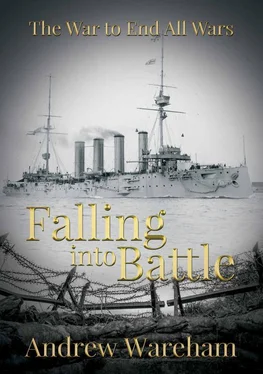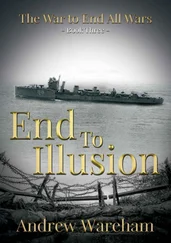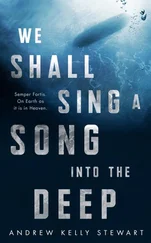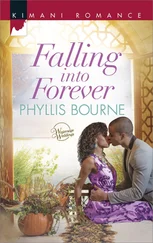“Five, possibly six, heavy columns, pushing to surround Paris like the fingers of a clutching hand. This might well be the most westerly. Or it might not. There will be other troops coming up behind to occupy Belgian and French territory overrun by the columns. Cavalry spreading out in a scouting role, of course. We might, perhaps, be on the west of the advance. If we are, we can get away towards the coast and then southwest down towards the rest of the BEF.”
It did not seem sensible for an attenuated company, separated from its battalion, to consider any action other than a rapid retreat. They examined the countryside to the west and then the south.
“The lane we’re following shifts south-easterly, sir. It seems to cut across towards the main road.”
“It does, Baker, and we ain’t playing that game. What can we see towards the coast?”
The answer was ‘more hills’.
“Go down to the next little valley and follow the stream, sir? The water must be flowing towards the sea.”
“Don’t like the idea of being down low, Baker. This hill seems to be a bit of a ridge. We can see some distance from it. Follow it, I think. It curves a bit, north and south, but goes more or less to the southwest.”
“Exposed, sir. Open to the Uhlans, if they spot us.”
“They are heading south, mostly, Baker. We can risk it.”
They marched, following the line of hills, made two miles in the following hour before coming towards a larger valley where a river had cut through the ridge.
“Road, sir!”
They halted while the two officers looked down across a quarter of a mile of sandy slope, lightly covered in summer-browned rough grasses. The river ran next to a gravelled wagon road, big enough to be a busy link between largish towns in peacetime. There was a low hedge and shallow ditch beside the road, simple drainage to keep the surface passable in rain.
They turned south and saw the outskirts of an industrial town, coalmines and the distant shape of a blast furnace. There were more pitheads in the opposite direction.
“Dust up the road north, sir.”
There was no cover in the immediate area.
“South, at the double. Down the hillside a few yards, Sergeant Grace, out of sight of the road.”
The officers remained, kneeling low, expecting to be no more than brown blobs on the hilltop, a pair of low bushes, invisible to the casual eye.
“Need damned field glasses, Baker. Not issued and I have never bought my own.”
Richard said nothing, wondered if it was because he had not been able to afford them or had merely been too feckless to bother. He was finding less than wholehearted respect for his captain – he was a man who would take the easiest way out of any situation, thinking from minute to minute, not planning ahead; he had no scheme for getting back to the BEF.
Captain Platt gave a running commentary on all he could see.
“Horse. A small troop of hussars of some sort. German, from the helmets. Carrying sabres and carbines in buckets. Light dragoons, more strictly. Thirty or so. One officer to the front. A man behind him with a guidon, very old-fashioned. That’s the little flag on a lance; sort of thing you might expect from provincial, backwoods units, not from frontline troops. Let them go past.”
They watched the cavalry go by at the walk, in no hurry to reach any specific destination. They were almost out of sight, half a mile to the south when Richard saw them beginning to deploy, to spread out into line abreast.
“What are they doing, sir?”
Platt watched, hand over his eyes, peering into the distance.
“Making ready to charge, Baker. They must have come across some of ours…”
“Down to the road, sir, ready to stop them if they are driven back? We could hunker down in the ditch – it will be dry.”
Captain Platt did not fancy being so aggressive, but the suggestion had been made and heard by the men. He had no choice than to acquiesce.
“At the double! Keep low.”
“I’ll take the left, sir.”
Richard did not wait for agreement, ran his men downhill and into the sparse cover.
“Pickford. If they come this way, the officer is yours. Then look for any man with stripes.”
“Got ‘em, sir.”
The men knelt, rifles at the ready. Richard remembered the boarding party drill that had been beaten into him as a midshipman.
“Except Pickford, number off, odds and evens. Pickford, fire at will. Remainder, wait my call. Rapid fire, ten rounds when I shout, evens first. Number off, now.”
The mutters came from the left.
“One.”
“Two.”
“Three…”
Sergeant Grace nodded approvingly. Captain Platt looked puzzled.
“Charging, sir!”
Pickford was watching to the south, had eased himself into a prone position.
“A double line of riflemen, sir. Looks like a full company.”
The chatter of rapid fire reached them.
“Must be two out of three of the horses down, sir. Wiping ‘em out, sir. Ten of ‘em left, at the dead run back this way, sir.”
“Ready, men. I want the rest knocked down, every last one of them. Evens, ready.” Richard turned to Captain Platt. “Coming fast, sir.”
“Fire at will, Baker.”
Captain Platt was out of his depth, was only too happy to pass the responsibility across to Richard.
The horses were growing bigger, the ten survivors in no sort of order, getting out of the disaster behind them, looking over their shoulders.
“Evens, fire!”
The Lee Enfields barked and the ten fell, horses tumbling and screaming, men wailing, utterly destroyed.
“Got ‘em! Deal with those horses, Corporal Abbott.”
One dragoon heaved himself to his feet. He still had his sabre in his hand and waved it at Corporal Abbott.
“Pickford!”
There was a single shot and the survivor was snatched off his feet, spraying blood from his chest.
The men tidied up, killing the injured horses and ignoring the wounded men other than to relieve them of the contents of their pockets and saddlebags, and quickly made ready to march.
“Join with the company down the road, sir?”
“Yes… Yes, by all means. Quite right, Baker. Just what I was going to order. Well seen, young man. Company, form up. Sergeant Grace, down the road to the forces there.”
They marched, as smartly as they could manage, down the half mile to the waiting company.
“Who goes there?”
“D Company, Third Bedfordshires.”
“Christ! Is that all of you?”
“We may be all of the battalion, soldier.”
“Beg pardon, sir. Rearguard, Lancashire Fusiliers, sir. E Company.”
The company commander greeted them more formally.
“Captain Porteous, E Company. You look as if you have had a hard time of it, gentlemen. Tidied up those horsemen very neatly, I must say. Von Kluck will be a long time waiting for their scouting report! Best you should see the major – we are falling back on the left companies who are holding in the town itself. Corporal, take these gentlemen to the major.”
They marched more than a mile, passing through the industrial outskirts of a grey, grimy steel town before coming to older cobbled roads and then into a mediaeval city centre, narrow two and three storey black and white houses, timbered and plastered frontages and steep tiled roofs. The road entered a two acre square, the focal point of the town, all of the streets converging. Any force passing through would have to come into the square or navigate back alleys in a tortuous circle. The half battalion was ripping up cobblestones and tramlines and using them to barricade the roads coming in from the north.
Richard looked around him, saw almost all of the premises closed, their shutters down; one or two opportunist bars and cafes were taking the coins of the English soldiers. Distant down the southerly streets he could see civilians in full flight.
Читать дальше












